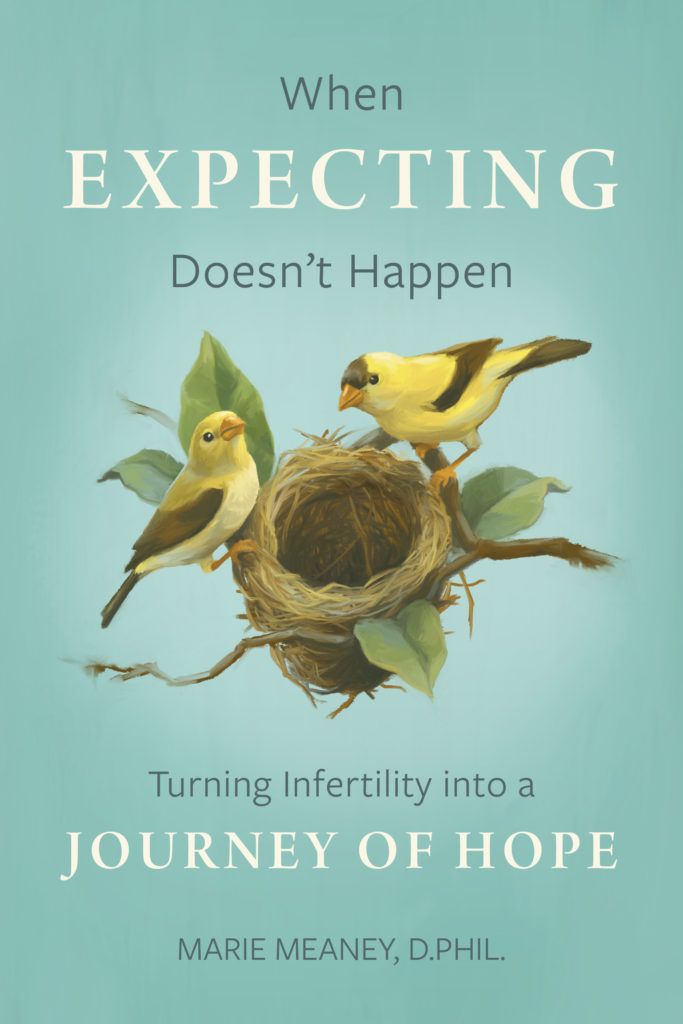
As couples start realizing that something isn’t quite right and that babies aren’t coming as easily as expected, they have to face many heartaches. The typical pattern of denial, anger, bargaining and depression seem to be on a perpetual loop, while acceptance seems impossible. Once the couple is beyond denial and takes on a proactive attitude, they find themselves (except if their medical issue is easily solved) frustrated that nothing seems to be working. Promising medical treatments fail to give them the much-desired child, while positive thinking flounders very soon and the throbbing pain in their hearts only seems to be getting worse.
The temptation to adopt a wrong attitude or to take shortcuts is great. Sometimes we are even under the false impression that this is pleasing to God. It is normal to want to alleviate our suffering, and indeed we should do so. But it is important to realize that some methods make matters worse and embitter the heart.
I wish to do the right thing, to carry my cross courageously, not wanting to burden others with my sorrow, and I therefore strive to control my emotions. Though courage and self-denial are admirable virtues, they can be problematic when they come at the cost of mourning. Then they grow into an avoidance mechanism. The implicit expectation is that somehow I can hoist myself out of my pain by holding it all together. But this, unfortunately, is rarely the case. Paradoxically, by trying to evade a suffering that I cannot resolve, I remain stuck in it. Instead, by accepting it, I can get beyond the acute sting and embittering hopelessness, eventually finding inner peace. But this is difficult, often long and heartbreakingly painful. And it means humbly accepting that I have to let go—though of course, I can and should continue to look for medical solutions.
Even if dealt with admirably, infertility remains a suffering for many. I cannot escape the pain, and if I try, I will never find true peace. By embracing the Cross, I will hopefully come to feel ultimately that its burden is light; if I shun it, it will crush me all the more. I am asked to make an act of trust rather than of courage, namely to recognize that God is greater than this abyss of pain which threatens to devour me. So, I need to ask myself: Have I truly allowed myself to experience fully the suffering of childlessness, or am I trying to escape from it by embracing a stoic attitude?
Also, I need to be aware that there are different stages of mourning and that I might well never be quite done, though it becomes easier. When menopause starts announcing itself or the woman has a hysterectomy, when the time comes that we should have become grandparents, we will have to face our infertility again. Invited to yet another baby shower or baptism, another announcement by a friend that she is pregnant, the pain might well resurface. We may have thought that we were past this stage of taxing grief and be surprised by its intensity. But mourning is a process; though the pain lessens, it still manifests itself at certain moments.
There is no pre-set pattern as to how long or at which moments these phases of mourning hit us; and there is no shortcut to grieving our infertility, even though we can find support, consolation, and ultimately inner peace (though that is a gift, and not something we can bestow on ourselves). We have to traverse this mourning before we can find the peace and serenity which God promised to those who follow Him (see John 14:27).
When other people hurt us by their ill-chosen comments, it is good to keep in mind that they may well not know how painful infertility is. Perhaps they feel insecure, don’t know how to react, and say the first thing that comes to mind, not realizing the implications of their comments. They carry their own wounds, and our trial may stir up painful memories such as an abortion, the loss of a child, or their own infertility. Perhaps their pain was not sufficiently acknowledged and therefore, in talking to us, their own suffering, bitterness, and resentment resurfaces. Just as our situation is a challenge to them to be compassionate, so their lack of understanding and unfortunate words are a call for us to be generous in granting forgiveness and to be understanding. Remembering how we have lacked tact toward other people in the past and have probably added to their burdens can help us to be more forgiving.
To escape from the frustrating and seemingly futile waiting time for a child, I might attempt to fill the void with other things. Though work, travel, or other occupations are a good idea and certainly better than remaining depressed at home all day long, I shouldn’t expect them to cure me if I haven’t gone through the process of mourning. Then these escapes will only give a brief respite, preventing me from going through the pain and making it impossible for God to be present in my grief. As the divine doctor, He needs to touch my wounds to heal them. But if I don’t give Him access by remaining still and creating some inner space, He won't be able to do so. And then I won’t find inner peace; instead, exhaustion and depression will be the likely consequences. Therefore, times of quiet prayer are necessary in the midst of our activities.
Marie Meaney is a specialist on the French philosopher and mystic Simone Weil, on whom she has written two books. She holds graduate degrees in modern languages and philosophy from Oxford University and the International Academy of Philosophy (IAP) in Liechtenstein. She taught at the University of Villanova in Philadelphia before the birth of her daughter. Since then, she has taught courses for the International Theological Institute in Trumau, Austria. Her previous work on infertility has been published in French, German, Croatian, Hungarian, and Spanish.
You Might Also Like
When a couple faces infertility, the intense suffering can be hard to bear–and to convey to others. In When Expecting Doesn’t Happen, Dr. Marie Meaney offers hope and encouragement to couples and advice for those who wish to support them.
With firsthand knowledge, Meaney helps couples navigate the experience of infertility and unpacks Catholic teaching on reproductive technologies. Outlining which licit approaches can be taken and the “dead ends” offered by reproductive technologies which undermine the dignity of the couple and their potential children, When Expecting Doesn’t Happen contains both practical and spiritual wisdom to guide couples toward deep peace and authentic fulfillment.


